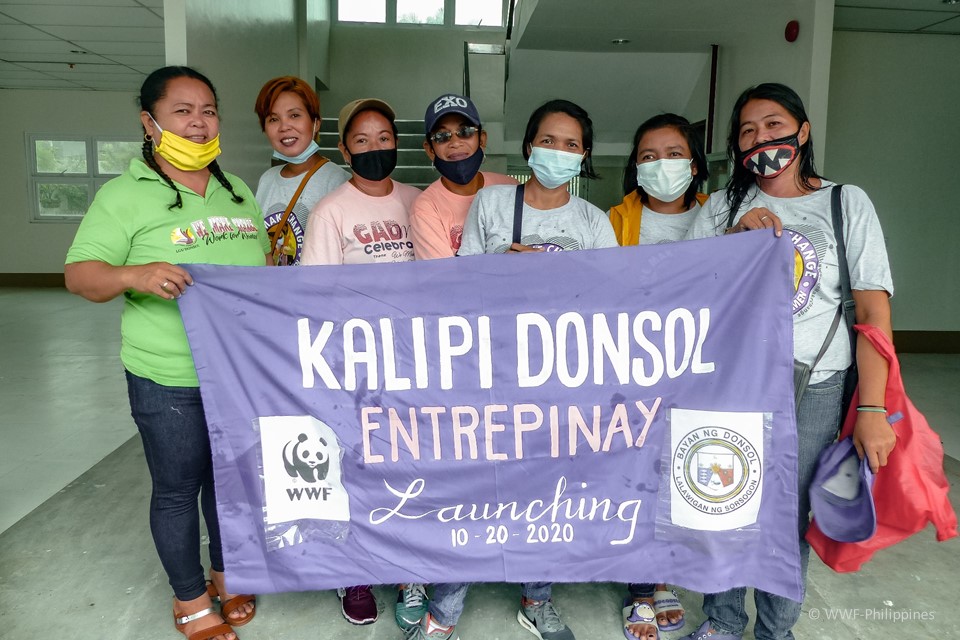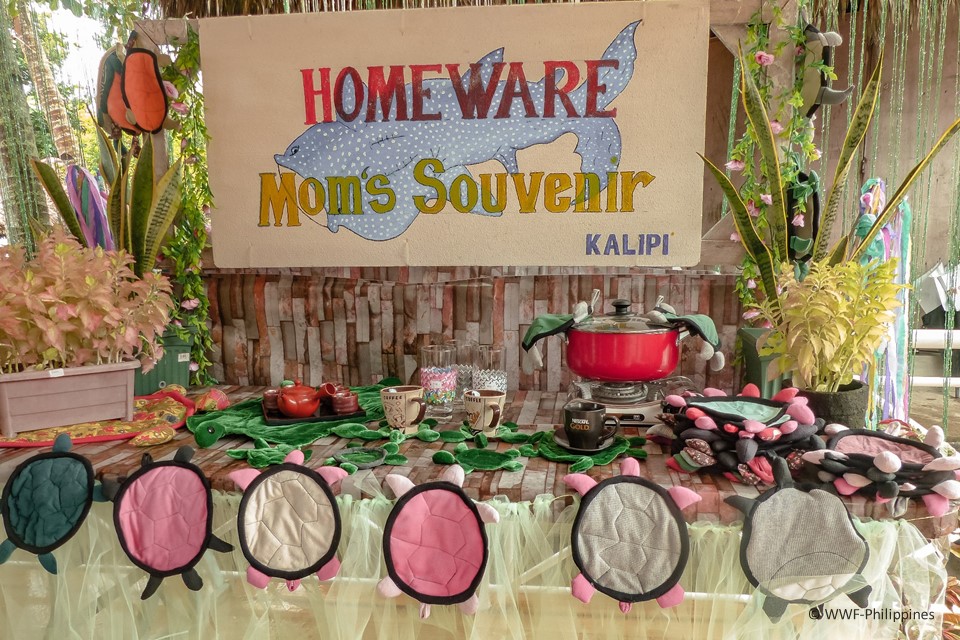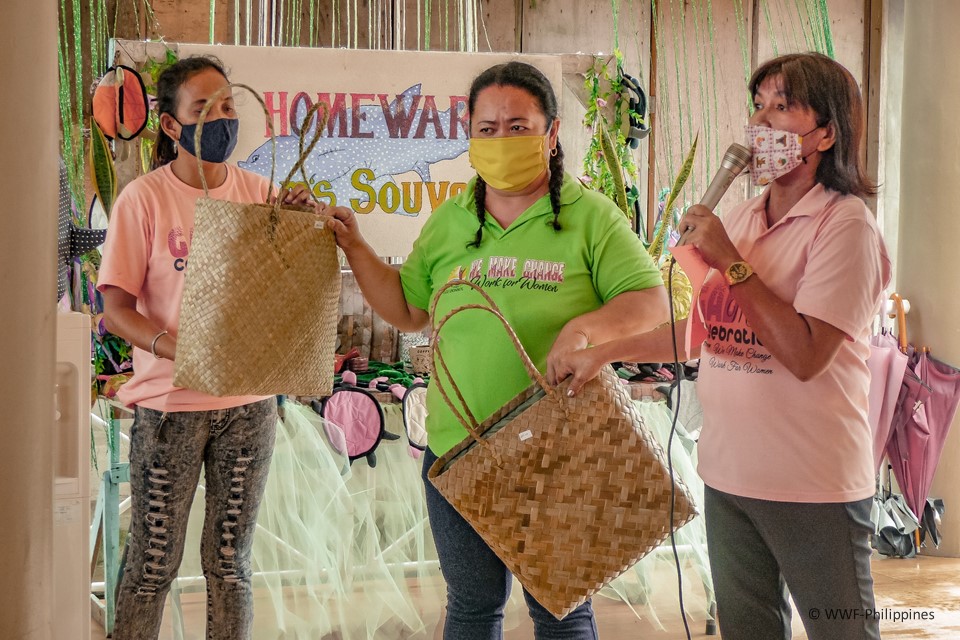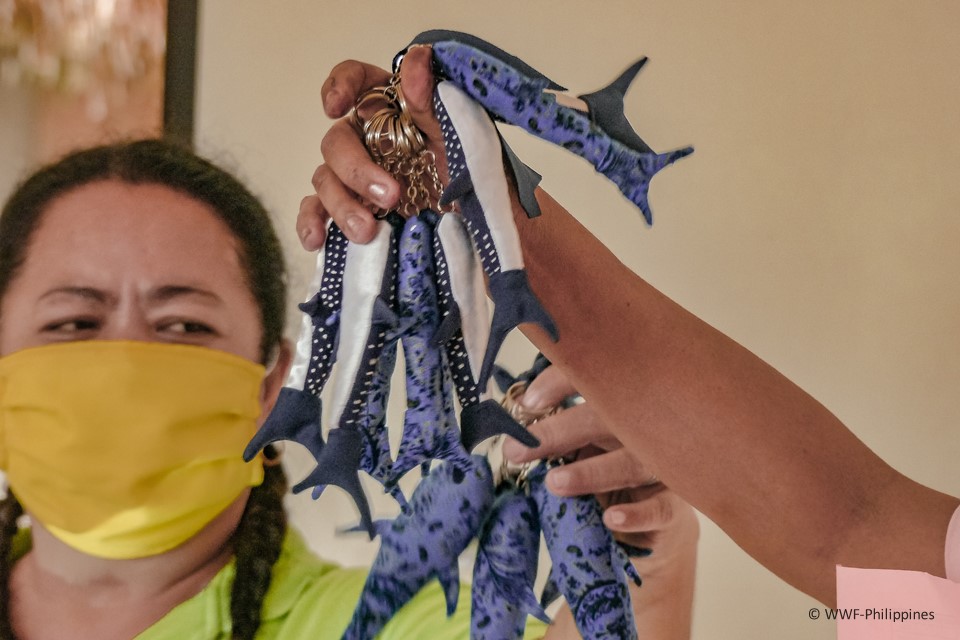KALIPI Launches in Donsol, Promotes Livelihood for Women and a Plastic-Free Environment
October 2020

Members of KALIPI Donsol hold up a tarpaulin at the launch of their plastic-smart products. Photograph © WWF-Philippines
Donsol, Sorsogon – Kalipunan ng Liping Pilipina (KALIPI) Donsol launched a line of plastic-smart products in Donsol, Sorsogon, together with the World Wide Fund for Nature (WWF) Philippines.
The province of Sorsogon shares a border with the Ticao-Burias Pass Protected Seascape (TBPPS). The TBPPS, a critical habitat, is home to the endangered whale shark. WWF-Philippines has been working with the LGU of Donsol on the conservation of the whale shark since 1998.
Human activity in the provinces surrounding the TBPPS pose a threat to the integrity of the protected area. Plastic pollution has become one such threat, trapping fish and clogging the stomachs of larger creatures, like whales.
KALIPI Donsol intends to address plastic pollution with the launch of their latest product line.
KALIPI was first formally launched in September of 2013. The goal of KALIPI is to empower Filipino women through community activities and the development of livelihood practices. KALIPI Donsol became an official accredited organization of Sorsogon soon afterwards.

A table displays the various plastic-smart products developed by KALIPI Donsol. The products provide additional livelihood and income for the women of Donsol. Photograph © WWF-Philippines
To combat the threat of plastic pollution while creating new livelihood opportunities, the woman’s rights organization rolled out various hand-woven products, including plushies and bags. Each product is made of plastic, some of which are picked off the beach while the rest are sourced from the local government waste collection service.
Since the start of September, KALIPI Donsol has collected and converted over 300 kilograms of plastic, 100 of which consisted of Styrofoam.
“I am thankful for this initiative, because it’s an initiative that will help solve a problem that we initially didn’t think would be a problem – plastic. Now it has become a problem, and we have to address it,” said WWF-Philippines Executive Director Joel Palma. WWF-Philippines works closely with the people of Donsol, pushing practices and policies to keep plastic from reaching the ocean and entering nature.
Present at the launch were representatives from local government agencies, partners of KALIPI Donsol. Representatives from local resorts and establishments were there as well, as potential clients of KALIPI Donsol’s plastic-sourced products.

Members of KALIPI Donsol present their products. KALIPI works for the empowerment of women across the country through community activities and the development of livelihood opportunities. Photograph © WWF-Philippines
“We’re thankful for those who have helped and who have been there, supporting us through different livelihood skills training sessions,” shared KALIPI President Wilma Arevalo. Opening women to more livelihood opportunities allows them to have a more active role in their communities, which is a major thing that KALIPI advocates for.
The Department of Trade and Industry is one such active partner, with DTI Sorsogon running livelihood training sessions and workshops for the women of KALIPI Donsol. “Hopefully you can help us too. We know that you are responsible businessmen and women. What we need is commitment, so that we may help many more,” shared DTI Sorsogon Director Heginio Baldano.
An important player in KALIPI Donsol’s efforts is the local Provincial Government – Environment and Natural Resources Office (PG-ENRO) of Donsol. In charge of waste management, they handle the segregation and transportation of plastics to the women of KALIPI. “On behalf of the provincial government of Donsol, we thank KALIPI for their products. We are here to help you expand your impacts,” shared PG-ENRO Engr. Maribeth Fruto.

Whale shark keychains, with ocean plastic kept inside. KALIPI Donsol hopes to both empower women and to protect the Ticao-Burias Pass Protected Seascape, or TBPPS, from the threat of ocean plastic pollution. Photograph © WWF-Philippines
Backed by WWF-Philippines and local government agencies, KALIPI Donsol Founder Neda Balictar oversaw the development of her organization’s plastic-sourced products. She presented these products during the launch, which included plushies, cup holders, bags, and other woven home accessories. She also introduced the members of KALIPI Donsol.
“I am very proud to be introducing these women to you. They always take that step forward. Without them, we wouldn’t be as strong as we are today,” shared Balictar. Balictar and her team plan on expanding the reach of their products, with the hopes of sending them out within the region and across the Philippines.
Supporting KALIPI’s product launch is but one of several efforts being undertaken by WWF-Philippines in helping Donsol become a plastic-smart city. The conservation organization is working to cut ocean plastic pollution entirely by the year 2030. Follow WWF-Philippines as they work to #ChangeTheEnding of the ongoing plastic issue.
For more information, please contact:
Mr. Jun E. Narvadez
Donsol Project Manager
mnarvadezjr@wwf.org.ph
For media arrangements, please contact:
Ms. Pam Luber
Integrated Communications Manager
pluber@wwf.org.ph
Ms. Chezka Guevarra
Public Relations, Media, and Events Assistant Manager
cguevarra@wwf.org.ph
